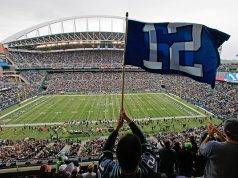In an election year that left a deeply divided citizenry, like the opposing pieces of a chessboard, pondering what even a Grandmaster could not predict would be the next propitious moves, the state of Washington placed its confidence behind a “best by test” strategic thinker in the role of Governor, someone who promised to make the smartest, soundest moves for all of his constituents.
Indeed, chess players in Washington were in a unique position to elect one of their own as current Attorney General Bob Ferguson, a two-time Washington state chess champion, was elected to become the next Governor of the state of Washington. Bob will apply both mastery and strategic problem-solving, two of his most formidable talents, when he is sworn into office on January 15.
Young Bob Ferguson began his chess journey at the age of nine when he asked for and received a chess set for Christmas. His father took him to the Boeing Chess Club where he learned the fundamentals of chess. He began to play in tournaments and when he was between 12 and 13 years of age, Bob started working with local Seattle chess master John Donaldson who later went on to become an International Master, a prolific writer of chess books, and captain of the US Chess Olympiad Chess Team.
Another player who influenced young Bobby was Seattle’s home-grown Grandmaster Yasser Seirawan. Bob won the Washington State Chess Championship title in 1984 and 1987. He even contemplated becoming a professional chess player and spent a short spell in Europe to improve his game. His analysis led him to decide to put the skills that had served him well in the chess world into the practice of law
Bob attended the University of Washington where he was elected student body president and went on to get his law degree from the New York University School of Law. He began his legal career in Spokane, serving as a law clerk in the US District Court for the Eastern District of Washington. He then returned to Seattle and joined the law firm of Preston, Gates, and Ellis. After four years there, Bob decided to utilize the skills he gained through chess in politics and ran for King County Council. He ran against a 20-year veteran of the council and during his campaign he knocked on 22,000 doors and won the election by a mere 500 votes. This was in 2003. During his time on the Council, Bob served as Chair of the Regional Policy and Law, Justice and Human Services Committees and co-sponsored legislation to place a ballot before the voters to generate revenue to improve health services for veterans and military personnel, among many other things.
In 2012, Bob was elected as the 18th Washington State Attorney General. He increased the size of the office to provide more services to the citizens of Washington State. His office won lawsuits against the likes of Comcast for their pricing schemes, against tuna and chicken food companies for price-fixing, and other consumer protection matters. Bob sued the Trump administration 97 times, realizing 22 victories and one loss.
Ferguson formed the Wing Luke Civil Rights Division of the AG’s office dedicated to protecting the civil rights of everyone in Washington. Bob filed multiple legal actions against the Presidents of both parties regarding the Hanford Nuclear Reservation and the delay in clean-up and for putting hundreds of workers at Hanford at risk to harmful toxic waste. One of Bob’s biggest victories as AG was taking on large drug companies that help fuel the opioid epidemic and won a $1.2 billion and counting settlement that will be used to combat the opioid and fentanyl crises in communities all across the state, This marked just a few of his achievements as Attorney General.
Practically every chess player knows the importance of strategic thinking skills. Among those skills are problem-solving, being creative, adaptability, anticipating, articulating your goals clearly, creating an implementation plan, three-question everything, asking strategic questions, analyze the options and risk objectives and management, simplifying the complicated and understanding the consequences. These skills are useful not only in chess but in your life as well, especially, in a career such as law and perhaps even in politics.
To quote Bob, “There’s often a moment in the game between players of equal strength, where you’re faced with a choice of playing it safe or making a move that’s going to change the nature of the game. I’ve trained myself to ask. “What’s it going to take to sharpen my position?” The vote for Bob was most definitely a winning move! [24×7]
This article was contributed by Duane Polich, publisher of NW Chess News, which covers the scholastic and community chess scene in Washington, Oregon and Idaho.






















